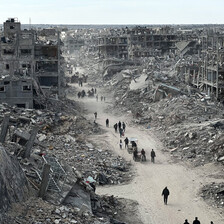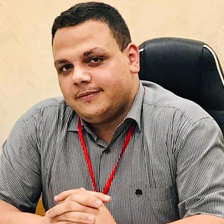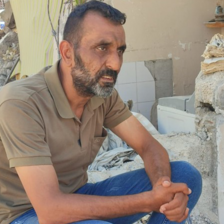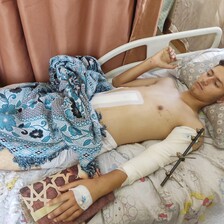The Electronic Intifada 29 July 2024

Muhammad Salmiya (left) and Iyad Awad following their release from Sde Teiman military camp. (Fedaa al-Qedra)
Iyad Awad was adamant that he must look after his mother.
In May, Israel dropped leaflets on Jabaliya refugee camp, northern Gaza, demanding that its residents leave.
Iyad helped members of his family to evacuate. But he remained at home with his mother, who had Alzheimer’s disease.
“When the [Israeli] army entered the house, they asked me why I did not leave,” he said. “I told them that I was with my sick mother and we could not go anywhere.”
An Israeli soldier then instructed Iyad to accompany him as the invading troops conducted a search of the multi-story building where Iyad lived.
The troops handcuffed Iyad.
“I told them that my mother needed someone to take care of her,” he said. “A soldier told me that he would bring me back to her.”
After hours of being away from his mother, Iyad walked a few steps. The Israelis shot him in the side of his body.
He was taken to hospital, where he underwent surgery.
Following the operation, Iyad was brought to Sde Teiman, a military camp in the Naqab desert.
The conditions there were unsanitary.
“There were more than 30 of us using one bathroom that was only cleaned once a week,” he said.
During approximately 70 days of detention, “I could not shower, cut my nails or change my clothes.”
“The quality of the food was very poor,” he added. “They would bring us a piece of toast with jam.”
Despite having been wounded, Iyad did not receive any medical care in the military camp. Apart from paracetamol, he was not given any medicine.
“I slept on the floor,” he said. “There was no mattress or bed.
“The temperatures were very high. It was as if you were lying on a hot plate.”
When Iyad was eventually released, he learned that his mother had been left to die.
“The neighbors found her dead on the bed” after Israeli troops had withdrawn from Jabaliya, he said.
As they had been unable to make contact with him, other members of Iyad’s family had assumed he had been killed.
“They were surprised when I got out of prison that I was alive,” he said.
Abuse on a massive scale
Prisoners in Sde Teiman are subjected to both verbal insults and physical abuse.
Iyad spoke about a young man named Fathi, who was released at the same time as him.
Fathi, an electrical engineering graduate, had been in good mental health before his detention.
That situation changed after Fathi’s jailers beat him and set dogs on him.
“The moment we were released, they told him to walk, but he could not walk because he had leg injuries,” Iyad said.
“They beat him and forced him to walk,” Iyad added. “He fell to the ground every time they beat him.”
“They beat him all over his body and hit him on the nose with the butt of a gun until finally they brought him a stretcher and carried him to a car.”
Muhammad Salmiya was arrested in Jabaliya during the May invasion. He was at home with his family at the time.
“During my entire time in detention, I was worried about them,” Muhammad said. “I was thinking about what the army did to them after they took me away.”
Muhammad was beaten. His health also deteriorated considerably.
He was constipated during his detention.
The Israelis attached a catheter to him. It was not changed until he was released back to Gaza.
Sde Teiman is in the news this week.
On Monday, Israel’s military police took nine reservists at the camp into custody over allegations that they subjected a Palestinian to serious abuse.
A number of soldiers fought against the military police on their arrival, while the raid prompted protests by far-right political activists, some of them lawmakers in Israel’s parliament, the Knesset.
While the episode was certainly dramatic, the issues involved are far bigger than allegations against nine reservists.
Sde Teiman must be seen as a place where Palestinians arrested as part of a genocide have been tortured both physically and psychologically on a massive scale.
Fedaa al-Qedra is a journalist in Gaza.





